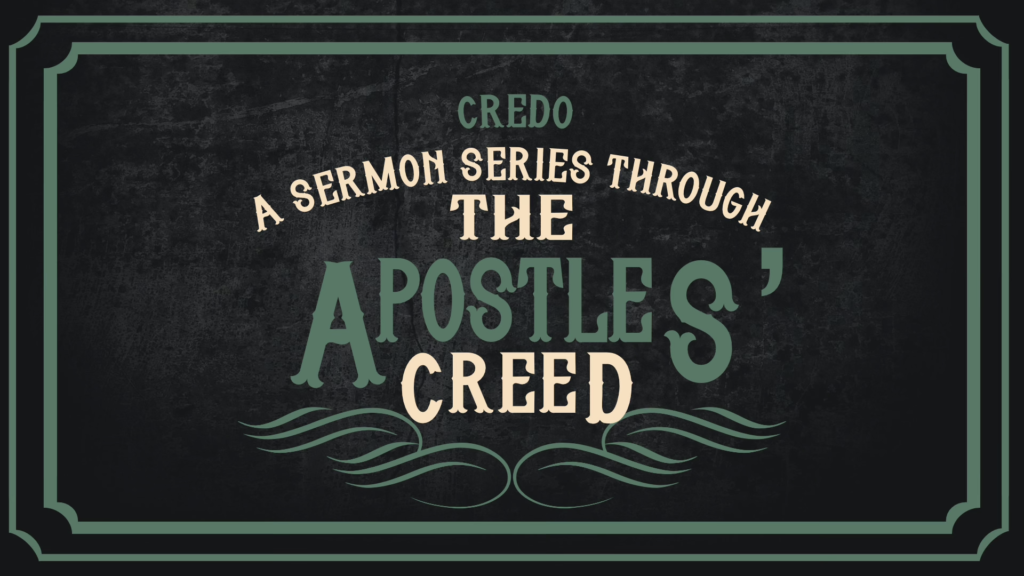
Can you imagine how unbelievably awesome it would be to find a long-lost treasure? In January of this year, Reader’s Digest published an article entitled, “The Most Incredible Undersea Treasures Ever Found.” The stories and their accompanying pictures were amazing. Here are a few:
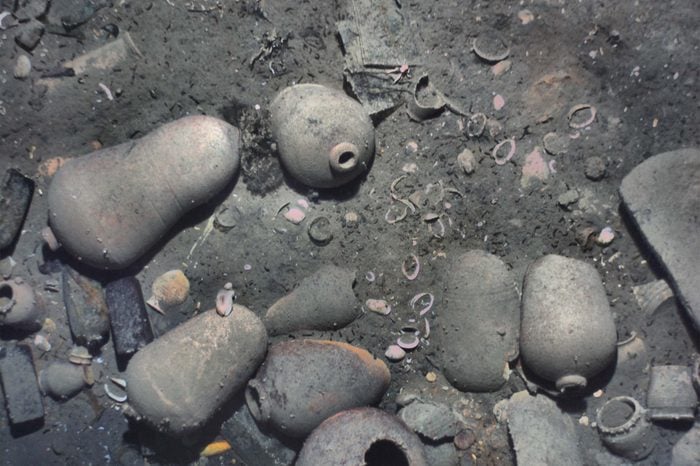
Called the “holy grail of shipwrecks,” the Spanish galleon San José was carrying a treasure of silver, gold, and emeralds worth billions of dollars today. The galleon sunk after a battle with British ships off the coast of Cartagena, Colombia, in 1708. Three hundred years later, in 2015, the wreck was discovered on the ocean floor.
The website Scuba Diving writes of the find: “Gold, silver and emeralds in the wreck of a Spanish galleon worth an estimated $20 billion have ignited an international claims battle between Colombia, Spain, Peru, Panama and Bolivia.” Colombia is keeping the exact location a secret![1] Fascinating!
Here’s another from Reader’s Digest:
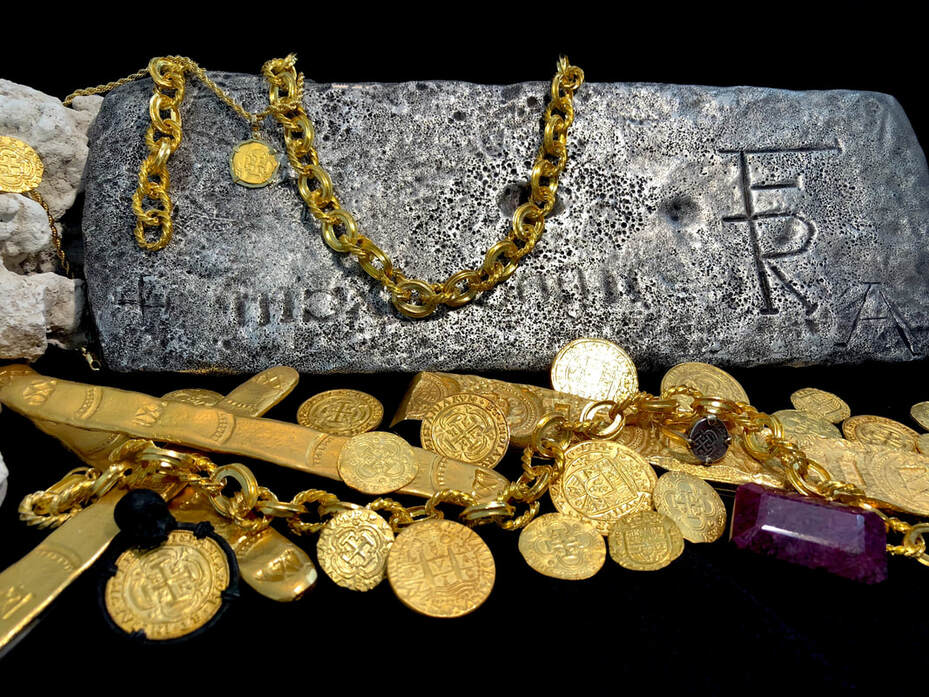
Turns out that 1985 was a big year for shipwrecks: The sunken “mother lode” of the Nuestra Señora de Atocha was found in July of that year off the coast of Key West, Florida. Famed treasure hunter Mel Fisher searched for 16 years before making the discovery. The ship, commonly referred to as the Atocha, was loaded with treasure to bring to Spain when she left Havana, Cuba, in 1622—and sailed straight into a hurricane…You can see more of the trove, in total estimated to be worth around $450 million, at the Mel Fisher Maritime Museum in Key West.
Here is one which I find very very cool indeed!
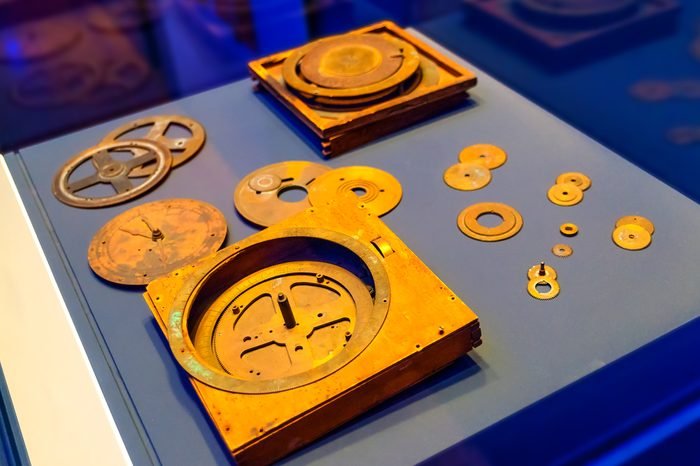
This ancient site off the Greek island Antikythera may have been found back in 1900, but researchers are still unearthing new treasures there. The wreck is famous for the Antikythera mechanism, a complex device made of gears nicknamed the “world’s first computer” for its ability to track the sun and moon and predict eclipses. The device is dated to the second century B.C., but nothing else like it from that time period has ever been found.[2]
I love stuff like this! Oh, yeah, and there is one more treasure, long buried, that I want us to discover today. Here it is:
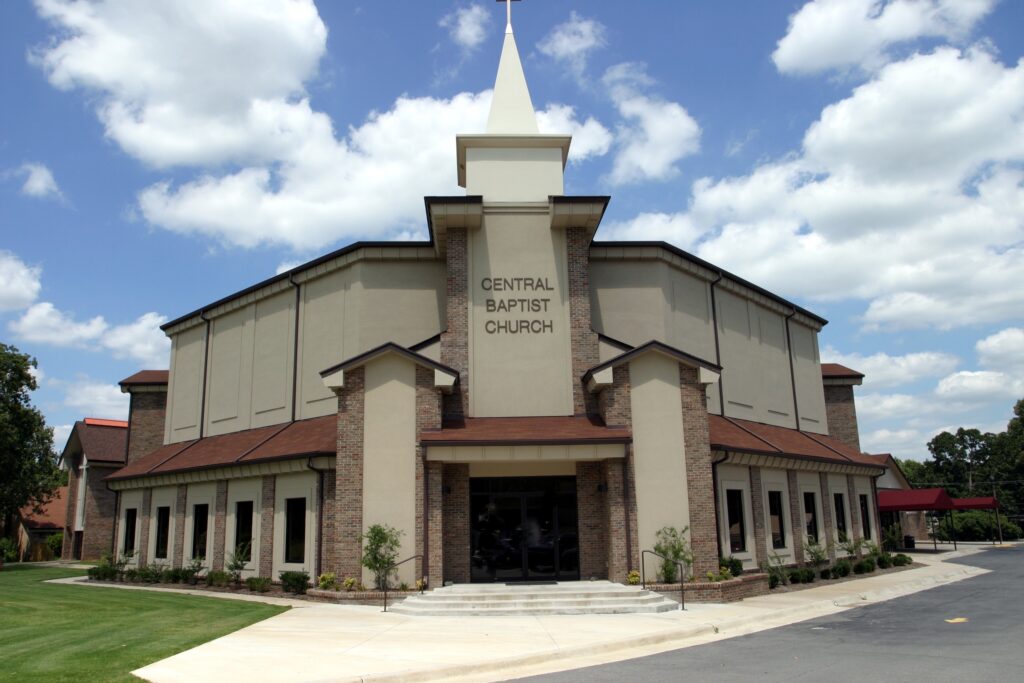
That’s right: Central Baptist Church, North Little Rock, Arkansas. I am not kidding. The church is an absolute treasure, but it too has been buried. How so? Buried by what? It has been buried beneath years of neglect or ignorance or our own failure to be the church or worldly opposition to the church or biblical illiteracy that blinds us to what the church is supposed to be. We know the church exists, but do we know the value of this treasure?
Make no mistake: When the Apostles’ Creed has us say “I believe in…the holy universal church” it is having us talk about something very valuable indeed.
That phrase, “the holy universal church,” carries with it three qualifiers that will help us get at why the church is so valuable:
- the
- holy
- universal
Let us consider these in turn.
The church is one: “the”
We begin with the definite article, “the.” That “the” in “the holy universal church” is critically important. It communicates outright that the church is one and only one. There is only one true church, and it consists of all who follow Jesus!
The apostle Paul was positively emphatic on this point. In 1 Corinthians 12, for instance, Paul drew a parallel between the church (the body of Christ) and the human body.
12 For just as the body is one and has many members, and all the members of the body, though many, are one body, so it is with Christ. 13 For in one Spirit we were all baptized into one body—Jews or Greeks, slaves or free—and all were made to drink of one Spirit.
The church is the body of Christ. There is only one body of Christ. But there are many members of that one body. This analogy must be understood. Individually, then, we might say that each person and all their differences are members, but, together, they are members of one and only one body.
In Ephesians 4, Paul makes the point again, this time through a powerful repetition of the number one. Listen:
4 There is one body and one Spirit—just as you were called to the one hope that belongs to your call— 5 one Lord, one faith, one baptism, 6 one God and Father of all, who is over all and through all and in all.
If you look closely, you will notice seven one’s there:
- one body
- one Spirit
- one hope
- one Lord
- one faith
- one baptism
- one God and Father of all
Seven is the number of completion. Thus, this seven-fold repetition reinforces the point: there is only one church!
What, then, of denominations, of all the different groups that make up Christianity? It is a sad reality but likely unavoidable, for different Christians have interpreted scripture in different ways, leading to these divisions (along with, of course, human pride and a propensity for conflict and division!). But here is the key: the existence of denominations, while not ideal, need not necessarily mean we cannot hold to the oneness of the body of Christ. We should see, in other words, all Christian denominations as members of the one body of Christ. There are believers in all denominations and they comprise the body.
Furthermore, our oneness is grounded in the essence of our faith about which we should all agree, not in our differences. Meaning, churches can disagree over church polity and governance or even baptism and still say “Jesus is Lord!” This is why something like the Apostles’ Creed is so important: it grounds us all in the one true faith and represents our commonality in basic Christian convictions.
What does this look like? Here is one example. In 1905, the first ever gathering of the Baptist World Alliance convened in London. These were Baptists from all over the world! In that gathering, the Scottish pastor Alexander Maclaren, spoke. I would like for you to hear what he said to this first gathering of international Baptists.
I should like the first act of this Congress to be the audible and unanimous acknowledgment of our Faith. So I have suggested that, given your consent, it would be an impressive and a right thing, and would clear away a good many misunderstandings and stop the mouth of a good deal of slander—if we here and now, in the face of the world, not as a piece of coercion of discipline, but as a simple acknowledgment of where we stand and what we believe, would rise to our feet and, following the lead of your President, would repeat the Apostles’ Creed. Will You?[3]
What Maclaren was doing here was saying, “We are not schismatics! We are part of the one body! We hold to the faith once and for all delivered to the saints!” In this way, he maintained his Baptist convictions yet called for an acknowledgment of the oneness of the body of Christ.
Even so, let us grieve our divisions and refuse to be at home with them. Let us strive for visible unity with other believers. Let us remember the words of Paul from 1 Corinthians 1:
10 I appeal to you, brothers, by the name of our Lord Jesus Christ, that all of you agree, and that there be no divisions among you, but that you be united in the same mind and the same judgment. 11 For it has been reported to me by Chloe’s people that there is quarreling among you, my brothers. 12 What I mean is that each one of you says, “I follow Paul,” or “I follow Apollos,” or “I follow Cephas,” or “I follow Christ.” 13 Is Christ divided? Was Paul crucified for you? Or were you baptized in the name of Paul?
The answer to these questions is, of course, “No!” Christ is not divided. Let us strive not to be either.
The church is called out: “holy”
The church is one, and the church is holy. If the oneness of the church speaks of its constitution, the holiness of the church speaks of its character. What does it mean to speak of “the holy universal church”?
The church is a redeemed, blood-bought body of Jesus-followers. We are holy by declaration of our justification before the throne of God on the basis of the finished work of God. We must be holy, too, by virtue of our transformed lives. In 1 Peter 2, Peter uses a number of images to stress this fact. He writes:
9 But you are a chosen race, a royal priesthood, a holy nation, a people for his own possession, that you may proclaim the excellencies of him who called you out of darkness into his marvelous light. 10 Once you were not a people, but now you are God’s people; once you had not received mercy, but now you have received mercy.
In so many ways this stresses the holy nature of the church:
- a chosen race
- a royal priesthood
- a holy nation
- a people for his own possession
- God’s people
Notice that Peter is not speaking of a special group of holy people within the church. He is speaking of the church itself! You are a chosen race. You are a royal priesthood. You are a holy nation. You are God’s people.
Baptist Christians used to talk a lot about the priesthood of the believer, that fact that, through Jesus, we are able not only to come before the Father, but also we are called to lives of priestly service to one another. We must reclaim this! This idea of the priesthood of the believer carries with it strong implications for holiness. Think of the countless biblical injunctions for the priests of God to be a holy people. This, now, through Jesus, is your calling, and it is through His shed blood and His indwelling Spirit that we are able to be this. The church must again be a holy body!
The church is not the world and therefore must stand, necessarily, in contrast to the world as it looks more and more like Jesus! Jerry Bridges has written:
Many Christians have what we might call a “cultural holiness.” They adapt to the character and behavior pattern of Christians around them. As the Christian culture around them is more or less holy, so these Christians are more or less holy. God has not called us to be like those around us. He has called us to be like Himself. Holiness is nothing less than conformity to the character of God.[4]
This is so! We must be conformed to the image of God. This means, at the least, making sure that the membership of our churches is comprised of actual believers. Jim Elliff has written, “The unconverted church member may well be the largest obstacle to evangelism in our day.”[5] My goodness, is this possible? Is it possible that many in our churches are not even born again?
I ask you: Are you saved? Are you a follower of Jesus? Is He your Lord?
And now I ask you this: Does your life reveal this to be the case? Would you say that holiness is your great aspiration and goal?
The church is worldwide: “universal”
The. Holy. Universal. Church.
The third word, universal, has proven to be the most commented upon as we have journeyed through the Apostles’ Creed. I have gotten more comment on this than any other. Why? Because the traditional translation of the Apostles’ Creed uses a different word. Those of you who grew up saying the creed will be more accustomed to saying “the holy catholic church.” Why, then, do we say “the holy universal church”?
Let us remember that our English translations of the creed are just that: translations. When the creed was first composed, the word “catholic” was used to mean “universal.” But over time the word “catholic” came to mean “the Roman Catholic Church.” By using “universal” instead of “catholic” we are simply (a) acknowledging that the word has evolved over time from its earlier meaning and (b) returning to the root definition to avoid confusion. Theologian Alister McGrath writes:
Many people find this part of the creed difficult to accept. Since the time of the European Reformation of the sixteenth century, many people have come to use the word catholic to mean “Roman Catholic.” In fact, this isn’t implied. The Greek word katholikos means “according to the whole,” or “universal.”[6]
When we say “the one universal church,” then, we are saying that the church is universal in the sense of being world-wide and consisting of all Christians everywhere. It is not limited to one locale. It is universal.
For this reason, some earlier Baptists still referred to themselves as catholic Christians. For instance, in 1697, the early Baptist Benjamin Keach, pastor of the Baptist church at Horse-lie-down, Southwick, in England, published his book, The Glory of a True Church. In his book, after giving a good definition of what a church is, Keach writes:
The beauty and glory of such a congregation consists in their being all converted persons, or “lively stones” (1 Pet 2:5), being by the Holy Spirit and faith of the operation of God united to Jesus Christ, the precious cornerstone and only foundation of every Christian, as well as of every particular congregation and of the whole catholic church…[7]
So Keach draws a distinction between the “particular congregations” (i.e., the local churches) and “the whole catholic church,” meaning the worldwide body of believers.
One more example: In 1679, a General Baptist confession of faith entitled “The Orthodox Creed,” likely written largely by Thomas Monck, appeared and was signed by a number of 17th century Baptist Christians. It is interesting to read articles 29 and 30, printed below with the original spelling.
Article XXIX. Of the Invisible Catholick Church of Christ.
There is one holy Catholick Church, consisting of, or made up of the whole number of the Elect; that have been, are, or shall be gathered, in one Body under Christ, the only Head thereof: Which Church is gathered by Special Grace, and the Powerful and Internal Work of the Spirit; and are effectually united unto Christ their Head, and can never fall away.
Article XXX. Of the Catholick Church as Visible.
Nevertheless, we believe the Visible Church of Christ on Earth, is made up of several distinct Congregations, which make up that one Catholick Church, or Mystical Body of Christ. . . .[8]
Here again we see the important distinction being made:
- One church. (the universal church)
- Many congregations. (the local churches)
The former consists of the latter. The reality of the latter does not dilute the reality of the former. The body of Christ is one church, and it consists of many local churches. In this sense, Baptists are indeed catholic Christians, part of the universal church, even though we are not Roman Catholics. Nigel G. Wright has correctly written:
Baptists are orthodox Christians, more than willing to affirm the faith of the church expressed in, for instance, the Apostles’ and Nicene Creeds…Properly understood, baptists are catholic Christians, embracing the historic faith of the church.[9]
Why does this matter, the universality of the church? It matters because it reminds us that the church is bigger than us: bigger than our congregation, bigger than our own local ministries, bigger than our individual customs. At any given moment, we are part of a singular body that stretches around the globe and includes every single person who has trusted in Jesus Christ as Lord and Savior!
Perhaps the most beautiful depiction of the church universal is to be found in Revelation 7. Here, John writes:
9 After this I looked, and behold, a great multitude that no one could number, from every nation, from all tribes and peoples and languages, standing before the throne and before the Lamb, clothed in white robes, with palm branches in their hands, 10 and crying out with a loud voice, “Salvation belongs to our God who sits on the throne, and to the Lamb!”
What a picture! What a scene! There will come a time, brothers and sisters, when the universal church becomes the local church, when we are gathered from all over the world before the throne of the Lamb! There will come a time when our denominational titles and our secondary distinctives and our controversies and our divisions melt away before the greatness of our crucified and risen King! There will come a time when the believer form Arkansas and the believer from Mogadishu and the believer from Sydney and the believer from Chile and the believer from Siberia and the believer from Ontario and the believer from Cambodia and the believer from Angola and the believer from Iceland all stand together as brothers and sisters visibly united before King Jesus. And our knees will bow and our tongues will confess together: “Jesus is Lord! Salvation belongs to our God who sits on the throne, and to the Lamb!”
Yes, the church is a treasure. Let us unbury it and let the world see its glory by showing the world the glory of its King.
[1] https://www.scubadiving.com/20-billion-treasure-photographed-in-san-jose-wreck-who-owns-it
[2] https://www.rd.com/list/incredible-undersea-treasures/
[3] Chute, Anthony L.; Finn, Nathan A.; Haykin, Michael A. G.. The Baptist Story (p. 214). B&H Publishing Group. Kindle Edition.
[4] Jerry Bridges, The Pursuit of Holiness (Colorado Springs, CO: NavPress, 2003), 30.
[5] Jim Elliff. Revival and the Unregenerate Church Member. (Christian Communicators Worldwide), p.8.
[6] McGrath, Alister. I believe (p. 95). IVP. Kindle Edition.
[7] https://founders.org/library/the-glory-of-a-true-church-keach/
[8] http://baptiststudiesonline.com/wp-content/uploads/2007/02/orthodox-creed.pdf
[9] Wright, Nigel G. Free Church, Free State. (Eugene, OR: Wipf & Stock, 2011), p.39–40.

The signers of “The Orthodox Creed” of 1769 document left me stunned, maybe shocked would be better. Here I am approaching 70 thinking that I knew a lot of church history until today. The signatories names was so convicting… so few of them recognized; I esp. like the phrase “on behalf of ourselves and many others”. It tickles me your preached message and your notes almost match. Sometimes using your notes for further study smites me more than your preaching efforts some weeks. Your notes are a big help to me; chasing down the sources, ref. and names just humbles me to the point of silence. So much left to do, so little time left for some of us old geezers…… the Creed series has been SpecTACular!!!!
Go CBCNLR team; yeah for Wym & the 1st Lady!!! 🙂 Pray for me & for the Peace of Jeru Salem